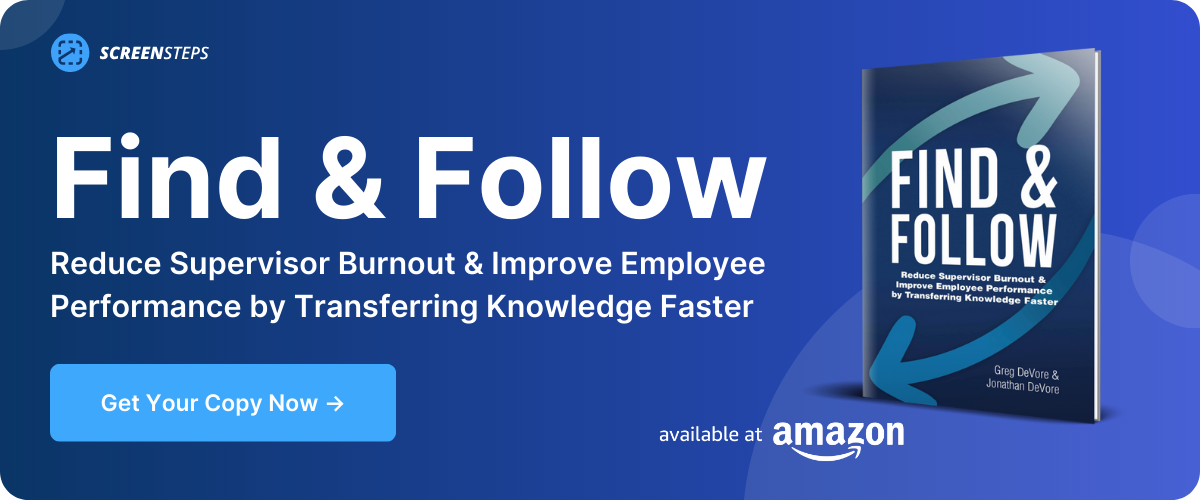How Does Tribal Knowledge Affect Different Roles in Your Business?
You know tribal knowledge is impacting your business. You’ve probably seen frontline workers struggle to remember what they’ve learned in training and supervisors working hard to support those workers.
But did you know that tribal knowledge has a rippling effect that impacts more than these two roles in your business?
If your company relies on tribal knowledge, it’s impacting more than one area of your organization.
As the co-founder of ScreenSteps — a knowledge ops solution that helps companies escape tribal knowledge — I’ve talked with hundreds of companies that expressed their challenges with tribal knowledge and its impact on their business.
How exactly does tribal knowledge impact the different departments in your organization?
Watch this 2.5-minute video for a general overview of the impact of tribal knowledge on your business. Then read on to learn about specific challenges that eight different roles and departments face when your company operates using tribal knowledge.
1. Frontline employees

The most obvious group affected by tribal knowledge is your frontline employees. This is your group that has the most turnover, which means they are newer to the company and have to learn a lot of information.
Emotional & functional impact
Some ways frontline employees are affected by tribal knowledge include that they are:
- Worried about making mistakes
- Stressed that they can’t help customers
- Nervous about bothering a supervisor
- Tired of needing corrections (have low confidence)
Financial impact
As you rely on tribal knowledge, the costs for this group include:
- Subject matter experts (SMEs) salaries
- Increased time in training (increased staff requirements & new hires salaries)
- Employees lost time they spend waiting for answers
2. Supervisors

Supervisors take the brunt of the day-to-day burden when it comes to tribal knowledge. They are the (SMEs) who spend their time answering frontline employees’ questions.
Emotional & functional impact
Some ways supervisors are impacted by tribal knowledge include feeling:
- Overwhelmed by the number of questions they are asked
- Stressed from multitasking
- Discouraged because they have constant interruptions and feel unproductive
- Worried employees will do something wrong
- Disorganized from being pulled in so many directions
- Frustrated from repeating themselves
- Overwhelmed by the amount of information they need to teach others
- Afraid to take time off because they’ll fall even further behind
- Anxious about taking a vacation or disengaging from work
- Stressed about how a major change will impact their team
- Frustrated because training doesn’t prepare new hires for the job
Financial impact
The main cost of tribal knowledge for supervisors is the time they spend answering questions. When supervisors need to individually answer employee questions, it means your company is paying for duplicated work. It takes two people to complete one task.
Plus, this is time spent answering questions that a supervisor should be investing in completing their numerous other responsibilities.
3. Trainers

When your business relies on tribal knowledge, it dictates how you train your employees. Companies that depend on tribal knowledge typically require that their employees memorize mountains of information about their company and its procedures.
This adds a lot of pressure on your new hires and your trainers. The trainers need to cover an overwhelming amount of information in training.
Emotional & functional impact
Training takes a lot of time and energy. Trainers who work in a tribal knowledge environment often feel:
- Confused about what to include in training and what to leave out
- Misaligned — they always feel out of sync with supervisors and QA
- Frustrated because supervisors complain that people don't know enough after training
- Rushed to prepare employees for their jobs (they never feel like they have enough time)
- Overwhelmed and busy running re-trainings because employees can’t remember everything from onboarding
- Frazzled as they struggle to keep up with changing situations and update the training with those changes
- Disconnected from the reality of a frontline worker’s job
Financial impact
The main cost of tribal knowledge for trainers is their salary and the time the trainers spend in training. If that time doesn’t result in employees who are knowledgable, independent, and efficient when they leave training, then those training dollars aren’t being spent effectively.
4. Human Resources (HR)

Companies that rely on tribal knowledge are difficult environments for employees to work in. This puts extra pressure on employees, which makes the job more stressful. Tribal knowledge companies usually have higher turnover.
With a high attrition rate, the Human Resource Department (HR) is extra busy. They have to spend more time recruiting. For primary frontline worker roles, they are often in a constant state of recruitment.
Emotional & functional impact
HR Department leaders in tribal knowledge organizations feel:
- Helpless as they listen to employees who are complaining that they don’t have enough training
- Frustrated as they address low employee NPS scores
- Exhausted as they repeatedly recruit for the same positions
Financial impact
Many factors increase costs for the HR Department when your company uses tribal knowledge. Some of those costs include:
- Increased recruiting costs
- Increased cost from employee attrition
- Higher headcount requirements (because of lower employee efficiency)
5. CEO
The CEO of the company oversees the big picture. They need to prepare the company to improve and change.
Ultimately, everything that impacts the other roles and departments also affects the CEO. But, the CEO isn’t always aware of the details of those impacts.
Emotional & functional impact
CEOs see the following symptoms of tribal knowledge in their company:
- Inability to adapt to change
- Inability to scale
- Succession risk
- Compliance risk
- Wasted investment from low technology usage
- Inability to adopt new technology
- Poor customer sentiment regarding customer support or service
Financial impact
The CEO sees the cost impact for all departments, but the biggest cost the CEO tracks is the headcount. When it takes more employees to complete one task, it drives the total employee headcount requirements up.
6. CFO

The CFO is heavily impacted by the costs of all of the departments because the CFO oversees the finances of the company.
Emotional & functional impact
You may think CFOs only care about numbers. And you may be right. But they also feel frustrated when they see the business fail to adapt to better ways of operating after they have approved huge investments in technology purchases.
Financial impact
Some of the top financial costs the CFO tracks include:
- Cost of employee errors
- Low ROI on technology investments
- High cost of attrition
- Increased headcount costs
7. Quality assurance (QA)

It’s your quality assurance team’s job to track the quality of your employees’ work. When attrition rates are high and employees keep making mistakes, it adds more stress to your QA team’s job.
Emotional & functional impact
Some ways your QA professionals are impacted by tribal knowledge include feeling:
- Unclear about what the “right” procedure is
- Frustrated that they can’t drive performance changes to frontline workers
- Confused why the QA scores are low despite training and coaching initiatives
Financial impact
The financial cost for the QA team is the price of mistakes. This could be the costs of those mistakes and/or the fees for compliance in a regulated industry.
8. IT support

Often, the IT support team is in charge of systemizing and documenting procedures. In a company that relies on tribal knowledge, there are little to no documented guides. Either way, your IT team feels the pressure.
Emotional & functional impact
IT support teams in tribal knowledge organizations often feel:
- Overloaded with a lot of questions
- Tired of complaints about no documentation or confusing SOPs
- Frazzled as they deal with constant interruptions that disturb the workflow and hurt productivity
- Unproductive as they take a long time to document SOPs
- Buried in backlog as they try to keep guides up to date
- Overwhelmed because it is difficult to delegate tasks
Financial impact
The main ways the IT Department notices the financial impacts of tribal knowledge are:
- Long onboarding time for new IT members
- Underused technology
- High levels of support requests
- Long resolution times
Refine your knowledge transfer strategy and escape tribal knowledge
When your company relies on tribal knowledge to transfer knowledge, the impacts reach across your organization. Tribal knowledge slows down your company’s workflow, decreases your quality of work, and increases costs.
Want to escape tribal knowledge?
With the ScreenSteps knowledge ops solution, you get the frameworks and technology to help you transfer knowledge more effectively and efficiently. This leads to faster training, fewer mistakes, and more confident and independent employees.
The first step to escaping tribal knowledge is understanding how your company is operating and transferring knowledge. The Knowledge Ops Maturity Model helps you determine where you are at and how you can advance to a more mature knowledge ops strategy.
Take this self-evaluation to see how mature your knowledge operations are. (Warning: Tribal knowledge is the lowest level of maturity.)




